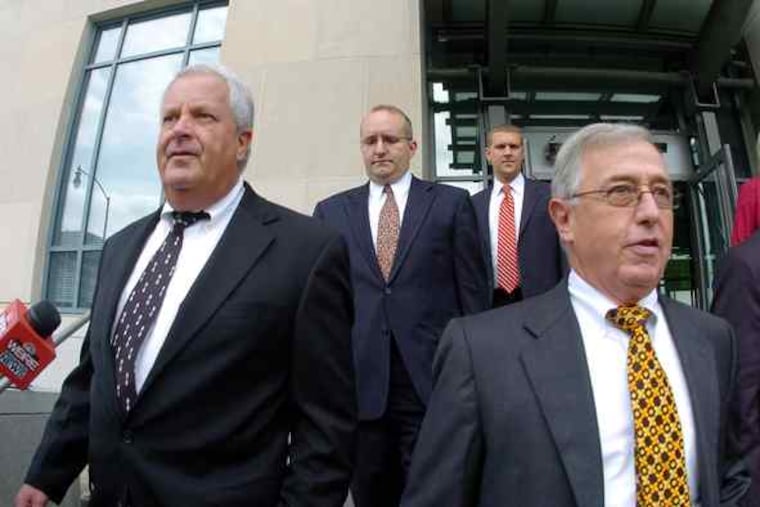The Pennsylvania ‘kids-for-cash’ judicial scandal, explained
Former Luzerne County judges involved with the so-called “kids-for-cash” scandal have been ordered to pay more than $200 million to hundreds of victims. Here is what you need to know.

Pennsylvania judges involved with the so-called “kids-for-cash” scandal have been ordered to pay more than $200 million to hundreds of victims in the judicial misconduct case.
The story stretches back to the early 2000s, when former Luzerne County judges Mark Ciavarella and Michael Conahan closed a county juvenile detention facility and sent children to a for-profit facility in exchange for millions of dollars in illegal profits. They were charged in 2009, and were later sentenced to lengthy prison terms.
“Ciavarella and Conahan abandoned their oath and breached the public trust,” U.S. District Judge Christopher Conner wrote this week. “Their cruel and despicable actions victimized a vulnerable population of young people, many of whom were suffering from emotional issues and mental health concerns.”
But what exactly happened in the kids-for-cash scandal, and who is involved? Here is what you need to know:
Who is Mark Ciavarella?
Ciavarella, 72, is a former Luzerne County juvenile court judge who was convicted of charges including corruption, racketeering, honest services fraud, and tax fraud in 2011. He was sentenced to 28 years in prison, and is serving that sentence in a Kentucky correctional facility. He is expected to be released in 2035.
As a judge, Ciavarella was known to have a “zero-tolerance policy” toward juvenile offenders, according to the Associated Press. He reportedly sentenced children as young as 8 to juvenile detention for small infractions like smoking on school grounds, jaywalking, and truancy. Many were first-time offenders.
Who is Michael Conahan?
Conahan, 70, was also a Luzerne County judge, and served as the county’s president judge from 2002 to 2006. He pleaded guilty to racketeering conspiracy in 2010, and was sentenced to 17½ years in prison. He was serving that sentence in a Florida facility, but was released to home confinement in 2020 due to the pandemic. He is slated for full release in 2026.
Nicknamed “The Boss” due to his role as president judge, Conahan pulled funding from a county-owned juvenile detention center and agreed to send juveniles to a for-profit facility, according to the AP. That event started the kids-for-cash scandal.
What happened during the kids-for-cash scandal?
Between 2003 and 2008, Conahan and Ciavarella funneled thousands of children to the PA Child Care and Western PA Child Care for-profit juvenile detention centers in exchange for $2.8 million in kickbacks. According to a 2010 AP report, the money came from PA Child Care contractor Robert Mericle and co-owner and attorney Robert Powell.
Often, the AP reports, Ciavarella found youths delinquent and quickly ordered that they be taken from the court with no time to defend themselves or speak with their families.
The Philadelphia-based Juvenile Law Center began investigating in 2007 after hearing from kids who were adjudicated in Luzerne County, and found that many children had been convicted without counsel. The following year, the group filed for relief in the Pennsylvania Supreme Court, but the application was denied. When charges against Ciavarella and Conahan emerged, the court reconsidered — and ultimately threw out the convictions of some 2,300 children impacted by the scheme.
Ciavarella and Conahan, meanwhile, were charged in January 2009, and negotiated plea agreements that called for shorter prison terms. Those agreements were rejected, and the pair walked back their guilty pleas. In September 2009, they were hit with a 48-count indictment. Conahan pleaded guilty, and Ciavarella’s case went to court in a trial that concluded in 2011.
Mericle and Powell, meanwhile, pleaded guilty in their own cases for failing to report a felony. In 2011, Powell received an 18-month sentence, and Mericle a one-year sentence. The pair reached a roughly $25 million settlement some time ago for their roles in the civil suit decided this week.
What’s happening with the kids-for-cash scandal now?
This week, Conner ordered Ciavarella and Conahan to pay more than $200 million to about 300 victims impacted in the kids-for-cash scandal. The ruling includes $106 million in compensatory damages and $100 million in punitive damages.
Since the suit was filed in 2009, according to the AP, a number of the victims have died from suicide or overdoses.
Conner last year heard from some 282 people who appeared in Luzerne County juvenile court during the former judges’ reign — 78 who were under 13 when sentenced to detention by Ciavarella. One unnamed victim reportedly said that Ciavarella “ruined my life” and “just didn’t let me get to my future.”
Conner calculated the compensatory damages by ruling that each plaintiff would be entitled to at least $1,000 per day of wrongful detention. However, the victims, who are now adults, are not likely to see “even a fraction” of the damages, the AP reported. Sol Weiss, a plaintiffs’ attorney in the case noted that the former judges’ assets will be evaluated, but they may not have money to pay.
Still, Marsha Levick, co-founder and chief counsel for the Juvenile Law Center and the plaintiffs’ attorney, said the ruling was “a huge victory” because it “recognizes the gravity of what the judges did to these children.”